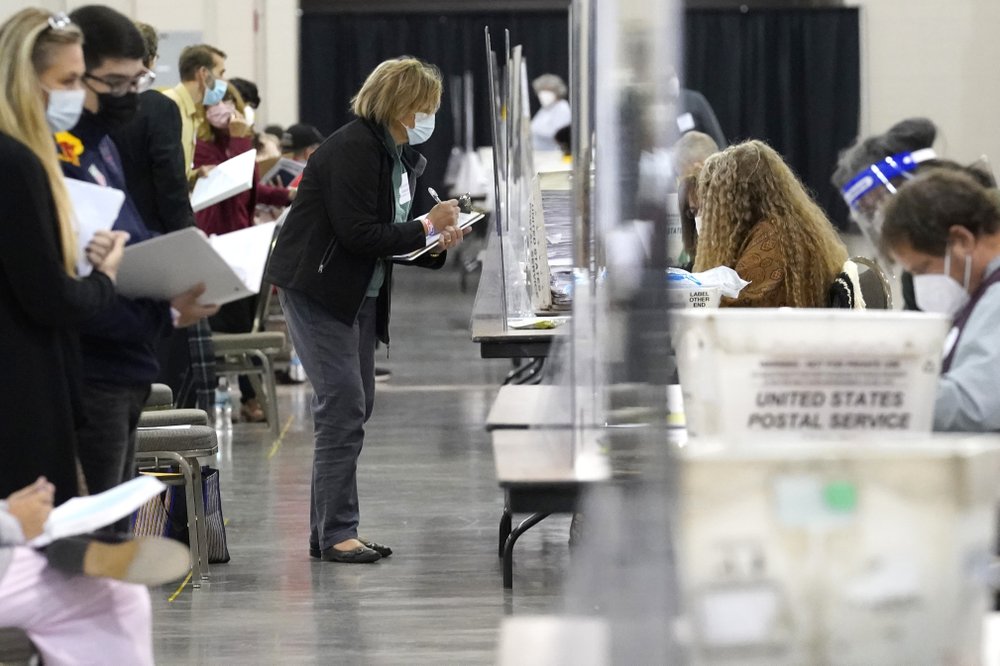Politics
Wisconsin judge upholds legality of private election grants

MADISON, Wis. (AP) — A Wisconsin circuit court judge ruled Wednesday that it was legal for private grants from a group funded by Facebook creator Mark Zuckerberg to be sent to the Democratic stronghold of Madison to help it run the 2020 election during the COVID-19 pandemic.
The ruling from Dane County Circuit Judge Stephen Ehlke affirmed an earlier decision by the bipartisan Wisconsin Elections Commission rejecting a complaint challenging the grant money from the Chicago-based Center for Tech and Civic Life as illegal bribery. It is the latest in a series of court rulings, both in Wisconsin and nationally, upholding the legality of the private grant money.
The lawsuit challenging that ruling as it pertained to Madison was brought on behalf of five voters by Erick Kaardal, a former secretary and treasurer for the Republican Party of Minnesota, who is an attorney for the conservative Thomas More Society. Kaardal also filed four nearly identical lawsuits challenging the grant money being awarded in four other heavily Democratic cities: Milwaukee, Racine, Kenosha and Green Bay. Those cases are all pending. The one targeting the grant money in Madison is the first to have a ruling.
President Joe Biden won battleground Wisconsin over Donald Trump by just under 21,000 votes. That victory has been upheld by numerous courts, survived recounts ordered by Trump as well as independent and partisan reviews. Much of the attention from Republicans since Trump’s loss has focused on the propriety of the Zuckerberg-funded grant money.
Ehlke ruled that nothing in Wisconsin law prohibited the acceptance of private funding to help run elections. He also rejected arguments that the money went to communities to help Democrats, noting that the grant money went to any community that applied for it, regardless of how its residents tend to vote.
The Center for Tech and Civic Life gave $8.8 million in grants to Wisconsin’s five largest cities — all Democratic strongholds that voted for Biden over Trump — as part of more than $10 million it gave to over 200 communities statewide. No community that applied for a grant in Wisconsin was turned down.
“There is nothing in the record demonstrating that the CTCL money was used to disadvantage certain populations over others,” the judge said in delivering his ruling orally from the bench two weeks after arguments were held. He noted that numerous federal courts have rejected similar arguments, including one in Wisconsin that denied a lawsuit filed by Kaardal seeking to block the use of the money prior to the 2020 election.
The Wisconsin Supreme Court refused to take a similar case shortly after the election. A federal judge in Washington, D.C., dismissed a third case over the grants last year.
The Republican-controlled Legislature passed a bill this year to make it illegal for private grant money to be used to help run elections, but Democratic Gov. Tony Evers vetoed it. Ehlke noted the introduction of the bill in his ruling to buttress his finding that the law allowed for the acceptance of the grant money.
“Quite obviously, the Legislature introduced this bill because nothing in existing Wisconsin law prohibited these things,” he said.
Kaardal has been an active force among those who are trying to sow doubt about Biden’s victory over Trump in Wisconsin. Kaardal has also worked with former Wisconsin Supreme Court Justice Michael Gableman on his taxpayer-funded investigation into the election. Kaardal also sued unsuccessfully in 2021 to overturn Biden’s win in Wisconsin.
Also last week, the Thomas More Society filed lawsuits alleging that the same five cities illegally used absentee ballot drop boxes in the 2020 election.
The Wisconsin Supreme Court is expected to rule within weeks in a case that could determine the legality of drop boxes.
Kaardal indicated after the ruling Wednesday that his focus was on preventing the use of drop boxes in the fall election and he may drop the pending cases in the four other cities related to the grant money received in 2020.
“Moving on — 2022,” he told the Milwaukee Journal Sentinel.

